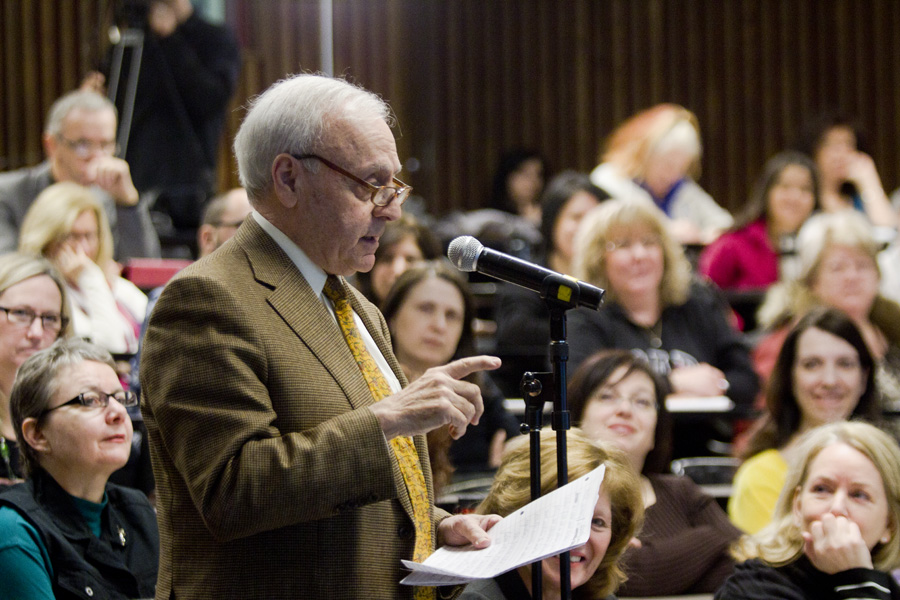On Feb. 11, Provost Anthony Masi hosted three Town Hall meetings to provide the McGill community with information about the university’s current financial situation, and to receive feedback about how to deal with cuts of $19.1 million to McGill’s 2012-2013 operating budget. The Quebec government announced these cuts last December, and Quebec universities maintain that they were given no prior warning.
McGill’s deficit could rise to approximately $38 million in the 2013-2014 fiscal year unless the university reduces its spending. Masi emphasized that, while no decisions have been made at this point, all units of the university will likely be affected by the cuts.
“We’re looking at every possible way of reducing our expenditures,” he said. “We’re going to look at every single aspect of this university’s finances, and when we have better information we will bring it forward to the [McGill] community.”
Masi said McGill received additional information from the provincial government last Friday that suggested the budget cuts may not last longer than two years, but will definitely continue into 2014. According to Masi, the government has threatened to withhold the last instalment of McGill’s funding from the government for the 2014 fiscal year if the university is not able to meet at least 50 per cent of the cuts by that time.
The majority of people who attended the meetings were faculty and staff members. Participants offered many suggestions for how the administration could cut down on McGill’s expenses, including reducing the length of the academic term to 12 weeks from 13 weeks, allowing staff members to take voluntary unpaid vacation time, and making cuts to services that are unrelated to the university’s academic mission, such as food services and residences.
Pointing to the fact that the Parti Québécois (PQ) have a minority government that could face an election as early as this year, PGSS Secretary-General Jonathan Mooney asked the administration to take more of a “long-term perspective” when making cuts this year.
“We need to be very measured and very cautious in our approach, because we don’t know how long this government is going to be in power … and the proposed reinvestments aren’t totally clear right now—what effect they’re going to have, what time frame they’re going to have,” he said.
However, Masi emphasized that the government’s unpredictable decisions and the lack of clarity in their communication make it difficult for McGill to know what to expect from government funding in the coming years. Since McGill’s budget was approved last spring, the university experienced tuition increases, the revocation of these tuition increases, and, most recently, the imposition of $19.1 million budget cuts, although the PQ government has pledged to reinvest in the university system in the future.
“We cannot treat these cuts as if they are temporary, because … four times in a single year, the government has changed its mind about the way in which it plans to fund universities,” Masi said. “Promising that they are going to reinvest again in 2016 is not something on which we can bank, so we need to do something today to make sure that we don’t aggravate an already tenuous situation for McGill’s finances.”
Masi suggested the cuts are a political move by a provincial government.
“If we find $19.1 [million] in cuts, then [the government will say] we had excess in our budgets all along and we’re not underfunded,” he said. “If we don’t find those cuts … [they’ll say] we’re simply unable to manage universities appropriately. Whatever the outcome, politically the government will appear to be winners, but they’re really threatening the entire university system.”
Some participants expressed concern with the way Masi referred to the PQ, including his description of the cuts as an “arbitrary” and “callous” decision.
“The Parti Québécois is a democratically elected government,” Nancy Crowe, a library assistant at McLennan Library, said. “I feel … a little bit like they’re being demonized.”
The majority of speakers, however, expressed frustration with the PQ for imposing these cuts on Quebec universities. Associate Librarian Marc Richard said the university could make a political statement through the way they choose to implement the cuts.
“There is probably some political advantage to choose things that will cause high visibility damage,” Richard said. “If [we] say we’ll decrease the contributions to the pension plan, that’s an actual thing .… [But] let’s say we were to close the medical school, and this caused a 20 per cent decrease in the number of doctors being produced in Quebec—it’s absurd, but the point is that certain types of damage can have [a] political advantage.”
Masi emphasized that the university has to avoid making a political statement at the expense of students and employees. He encouraged the community to express their comments on “the Red Blog,” email [email protected], or talk to their chair, dean, or unit head.
“We know what our priorities are and we have to try to protect them in order to ensure that the university will come out of this not weakened to the point of having to collapse,” he said. “We have to come out of this crisis stronger than we went in.”
Jason Opal, a history professor who attended one of the meetings, said he thought they did a good job of presenting McGill’s position on the cuts.
“I think the Town Halls will be very useful for understanding the financial predicament McGill now faces,” he said. “I just don’t know how useful or influential they will be in terms of coming up with possible solutions. That remains to be seen.”
—Additional reporting by Bea Britneff.









Pingback: Arts forum addresses TA concerns about budget cuts | McGill Tribune